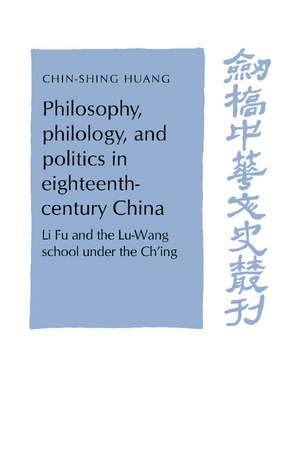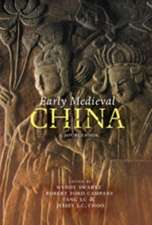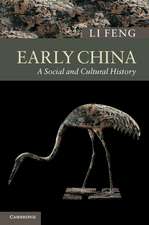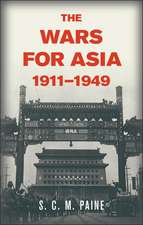Philosophy, Philology, and Politics in Eighteenth-Century China: Li Fu and the Lu-Wang School under the Ch'ing: Cambridge Studies in Chinese History, Literature and Institutions
Autor C. S. Huangen Limba Engleză Paperback – 17 dec 2003
| Toate formatele și edițiile | Preț | Express |
|---|---|---|
| Paperback (1) | 280.15 lei 43-57 zile | |
| Cambridge University Press – 17 dec 2003 | 280.15 lei 43-57 zile | |
| Hardback (1) | 690.95 lei 43-57 zile | |
| Cambridge University Press – 23 noi 1995 | 690.95 lei 43-57 zile |
Din seria Cambridge Studies in Chinese History, Literature and Institutions
-
 Preț: 289.74 lei
Preț: 289.74 lei -
 Preț: 280.35 lei
Preț: 280.35 lei -
 Preț: 431.92 lei
Preț: 431.92 lei -
 Preț: 284.39 lei
Preț: 284.39 lei -
 Preț: 296.34 lei
Preț: 296.34 lei -
 Preț: 418.98 lei
Preț: 418.98 lei -
 Preț: 286.30 lei
Preț: 286.30 lei -
 Preț: 353.24 lei
Preț: 353.24 lei -
 Preț: 321.05 lei
Preț: 321.05 lei -
 Preț: 292.02 lei
Preț: 292.02 lei -
 Preț: 207.53 lei
Preț: 207.53 lei -
 Preț: 372.59 lei
Preț: 372.59 lei -
 Preț: 322.89 lei
Preț: 322.89 lei -
 Preț: 321.05 lei
Preț: 321.05 lei -
 Preț: 259.16 lei
Preț: 259.16 lei -
 Preț: 388.90 lei
Preț: 388.90 lei -
 Preț: 280.53 lei
Preț: 280.53 lei -
 Preț: 359.67 lei
Preț: 359.67 lei -
 Preț: 426.78 lei
Preț: 426.78 lei -
 Preț: 404.09 lei
Preț: 404.09 lei - 11%
 Preț: 436.96 lei
Preț: 436.96 lei -
 Preț: 412.14 lei
Preț: 412.14 lei -
 Preț: 299.44 lei
Preț: 299.44 lei -
 Preț: 417.84 lei
Preț: 417.84 lei -
 Preț: 284.01 lei
Preț: 284.01 lei -
 Preț: 279.98 lei
Preț: 279.98 lei -
 Preț: 394.67 lei
Preț: 394.67 lei -
 Preț: 298.47 lei
Preț: 298.47 lei -
 Preț: 333.09 lei
Preț: 333.09 lei -
 Preț: 354.22 lei
Preț: 354.22 lei -
 Preț: 345.59 lei
Preț: 345.59 lei -
 Preț: 320.66 lei
Preț: 320.66 lei
Preț: 280.15 lei
Nou
Puncte Express: 420
Preț estimativ în valută:
53.61€ • 55.77$ • 44.26£
53.61€ • 55.77$ • 44.26£
Carte tipărită la comandă
Livrare economică 14-28 aprilie
Preluare comenzi: 021 569.72.76
Specificații
ISBN-13: 9780521529464
ISBN-10: 0521529468
Pagini: 228
Ilustrații: black & white illustrations
Dimensiuni: 153 x 229 x 17 mm
Greutate: 0.27 kg
Ediția:Revised
Editura: Cambridge University Press
Colecția Cambridge University Press
Seria Cambridge Studies in Chinese History, Literature and Institutions
Locul publicării:New York, United States
ISBN-10: 0521529468
Pagini: 228
Ilustrații: black & white illustrations
Dimensiuni: 153 x 229 x 17 mm
Greutate: 0.27 kg
Ediția:Revised
Editura: Cambridge University Press
Colecția Cambridge University Press
Seria Cambridge Studies in Chinese History, Literature and Institutions
Locul publicării:New York, United States
Cuprins
Introduction; 1. The original argument (1): 'Chu Hsi versus Lu Hsiang-shan' (Chu-Lu i T'ung): a philosophical interpretation; 2. The original argument (2): Wang Yang-ming and the problematic of 'Chu Hsi versus Lu Hsiang-shan'; 3. The critical dimension in the Confucian mode of thinking: the conception of the Way as the basis for criticism of the political establishment; 4. Li Fu: an example of the Lu-Wang scholar in the Ch'ing (1): his life; 5. Li Fu: an example of the Lu-Wang scholar in the Ch'ing (2): his thought; 6. Li Fu and the philological turn; 7. The price of having a sage-emperor: the assimilation of the Tradition of the Way by the political establishment in the light of Emperor K'ang-hsi's governance.
Recenzii
"This book is a pioneering work on its subject.....What Chin-shing Huang has achieved is a lucid, amazingly well-researched, and well-organized book....The book is worth reading by both specialist and nonspecialist." China Review International
"Chin-shing Huang is to be commended for his delivery to the scholarly world of the first book-length study of Li Fu....This book...is well thought out....This book is a pioneering work on its subject since there is no existing study which so meticulously examines Li Fu as a philosopher. Obviously Huang is well qualified to carry out this study. Despite the complexity of the subject, he analyzes everything with clarity and an understanding of its relevance. A careful observer, he is able to grasp firmly the many issues involving the two Neo-Confucian Schools....the author has taken a risk in dealing with such a profound and difficult subject, but the risk has been well worthwhile. What Chin-shing Huang has achieved is a lucid, amazingly well-researched and well organized book....The book is worth reading by both specialists and nonspecialists." Pei Huang, China Review International
"Chin-shing Huang is to be commended for his delivery to the scholarly world of the first book-length study of Li Fu....This book...is well thought out....This book is a pioneering work on its subject since there is no existing study which so meticulously examines Li Fu as a philosopher. Obviously Huang is well qualified to carry out this study. Despite the complexity of the subject, he analyzes everything with clarity and an understanding of its relevance. A careful observer, he is able to grasp firmly the many issues involving the two Neo-Confucian Schools....the author has taken a risk in dealing with such a profound and difficult subject, but the risk has been well worthwhile. What Chin-shing Huang has achieved is a lucid, amazingly well-researched and well organized book....The book is worth reading by both specialists and nonspecialists." Pei Huang, China Review International
Descriere
This book explains the contributions of Li Fu to the Lu-Wang school of Confucianism.









